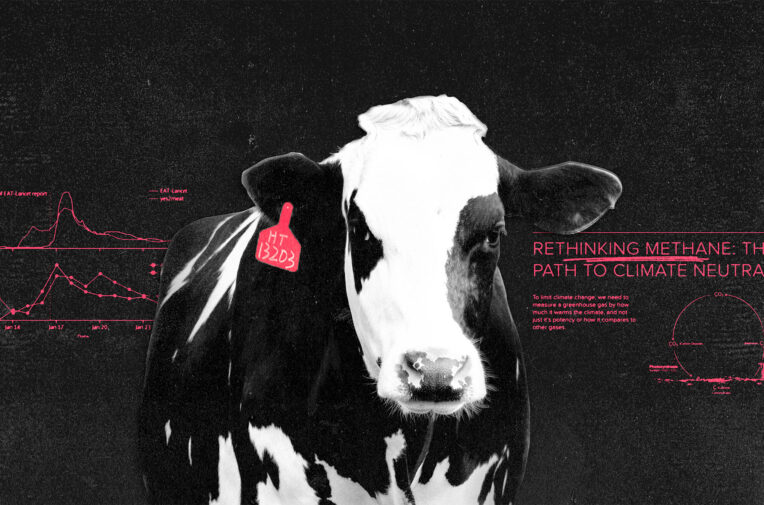
Image: Daughter Studio / Greenpeace Unearthed
Revealed: How the livestock industry funds the ‘greenhouse gas guru’
Documents reveal how the CLEAR Center at UC Davis, a research institute run by Frank Mitloehner, has become central to the agricultural sector’s PR and lobbying efforts
Revealed: How the livestock industry funds the ‘greenhouse gas guru’
Documents reveal how the CLEAR Center at UC Davis, a research institute run by Frank Mitloehner, has become central to the agricultural sector’s PR and lobbying efforts
Image: Daughter Studio / Greenpeace Unearthed
It was meant to be a turning point in the struggle to reform the food systems driving climate change and the global obesity epidemic.
In early 2019, as part of a collaboration between Norway-based nonprofit EAT and British medical journal The Lancet, a team of world-leading scientists released a report that sought to answer a critical question: “Can we feed a future population of 10 billion people a healthy diet within planetary boundaries?”
Their answer: yes, but not without “transforming” our current eating habits.
In its ‘planetary health diet,’ the EAT-Lancet Commission made precise, carefully calculated, recommendations for what foods can be eaten, and in what quantities, if we are to feed a growing population whilst preventing climate breakdown and improving public health.
It was a prescription for more greens and more beans, with less sugar and much less meat.
Adopting the Commission’s advice would mean many people – particularly those in wealthy western countries like the United States – would have to drastically cut down on meat. North Americans, the report said, ate more than six times the recommended amount of red meat.
The report had a huge media impact, generating nearly 6,000 articles across 118 countries. The BBC called it “the flexitarian diet to feed 10 billion” while the New York Times described it as a set of “new diet guidelines to benefit people and the planet.”
The Commission went on the road, presenting its findings to governments and international institutions around the world. The report was showcased at the World Bank, featured prominently at the UN’s Food Systems Summit, and helped inform food policy changes in Canada, Indonesia and the European Union.
But the opposition from meat and dairy advocates was fierce.
Pro-meat pundits and livestock lobbyists lined up to criticise the findings. The World Health Organization was reportedly forced to pull out of sponsoring EAT-Lancet’s launch event after complaints from the Italian government; and politicians in key consumer countries like the US showed no enthusiasm for including sustainability goals in official dietary guidelines.
The backlash, however, was most intense online.
An analysis of the phenomenon, published later in The Lancet, described how a “digital countermovement” managed to “organise rapidly” around the hashtag #yes2meat in the days leading up to the report’s launch. This “new sceptical community,” the journal admits, was soon “dominating discussions about the EAT-Lancet report in intriguing and worrying ways”. While the report was positively received by mainstream media, it “also led to highly polarised debates online including misinformation, conspiracy theories and personal attacks”. The Lancet concluded that these online controversies showed how a “rapidly changing media landscape poses serious challenges to science communication on health and climate issues”.
The authors of this analysis presented the emergence of the #yes2meat opposition as organic and spontaneous. However, Unearthed has learned that working alongside and within that movement was a coordinated effort to mobilise scientists and academics against the report.
And the people who led this effort, and who later celebrated their success in a private report to their agribusiness funders, were not working for a corporate PR agency or a lobbying firm, but for a newly-formed academic institute at a prestigious US university.
The Clarity and Leadership for Environmental Awareness and Research (CLEAR) Center at the University of California Davis, was set up in 2019 under the leadership of Frank Mitloehner, a prominent agriculture academic who is frequently quoted in the media discussing greenhouse gas emissions from livestock. The centre publicly describes its purpose as to “help the animal agriculture sector operate more efficiently” in order to “meet the demands of a growing population while it lessens its impact on the environment and climate”. The centre acknowledges it has some close ties to agribusiness – including some industry funding for its work – but presents those ties as an academic virtue, arguing that “collaboration with animal agriculture is key” to its success.
But now, a major new Unearthed investigation has revealed that the centre’s links to the meat and dairy industries are much deeper and more ingrained than previously known. More than 100 pages of correspondence between the CLEAR Center and its agribusiness supporters – obtained by Unearthed under Freedom of Information laws – reveal how the centre’s structure was agreed through a memorandum of understanding between UC Davis and an offshoot of the American Feed Industry Association (AFIA) – a trade body whose members include some of the world’s biggest livestock and feed producers. The documents show how, under the terms set out in this agreement, industry groups have committed millions of dollars of funding for CLEAR’s work, and the centre has committed to maintaining an “advisory board” of 12 of its agribusiness funders, to provide “input and advice” on the “research and communications priorities of the industry”.
The documents also show that the centre’s industry backers considered its greatest benefit to be its ability – as an apparently independent, academically credible voice – to make a positive case to the wider world about meat and dairy’s environmental impact.
This communications role is the focus of CLEAR’s briefings to its agribusiness donors. In these briefings, CLEAR charts a campaign to have the industry’s climate footprint revised and outlines research designed to undermine plant-based alternatives to meat products; it also celebrates its role in the pushback against EAT-Lancet as an early success for the centre, crediting Mitloehner with launching “a massive campaign” that, alongside the #yes2meat social media message, “was successful in swaying undecided audiences away from the EAT-Lancet report.”
Responding to Unearthed’s findings, Walter Willet, a celebrated nutrition professor at Harvard University and lead author of the EAT-Lancet report, said: “It is rather shocking that UC Davis, which is a leading research institution, allows their name to give credibility to a coordinated disinformation campaign supported by the beef industry.”
Mitloehner told Unearthed: “The CLEAR Center works with the livestock sector to make it better for the environment. To suggest we’re doing anything other than that is a gross mischaracterization of what we do.”
Industry funding
The documents show that the CLEAR Center is a product of an agreement between UC Davis and the Institute for Feed Education & Research (IFEEDER), the charity arm of the American Feed Industry Association (AFIA). The AFIA’s members include America’s leading meat producers and processors Cargill, Tyson Foods and Pilgrim’s, which is owned by JBS.
A spokesperson for Cargill said: “We participate in many industry associations that focus on advancing the industry and creating a more sustainable and resilient food system through innovation and research.” Tyson Foods did not respond to a request for comment.
UC Davis did not respond to requests for comment for this article.
In mid-2018, Joel Newman – then chief executive of the AFIA – wrote in a confidential memo to some members about plans to form a research centre at UC Davis tasked with “reviewing current research, filling research gaps and providing impactful messaging to address the significant misinformation regarding the environmental impact of poultry and livestock production.” The Center, he added, would also “collaborate with broader industry groups in supporting messages that are tangential to the environmental impact” to “magnify the impact of the center’s work and also the value to the broader industry.”
IFEEDER was so closely involved with the creation of the CLEAR Center, Newman’s memo shows, it even hired brand consultants to help come up with the institute’s name.
Newman signed the memorandum of understanding with UC Davis in November that year, including a gift of $2.88 million, to be made in installments over four years. In a recently revised timetable, the provision of this gift was stretched until 2026. The Center is currently receiving on average around $500,000 per year from IFEEDER. CLEAR’s website acknowledges the centre receives “philanthropic gifts” from IFEEDER, but claims that this support “does not influence the CLEAR Center’s research.” CLEAR only added this passage to its site last year, when an article in online magazine Undark disclosed $500,000-worth of the centre’s industry funding.
The centre has also received hundreds of thousands of dollars in direct donations from agribusiness companies and other industry groups, including nearly $200,000 from the California Cattle Council. In total, these bring the donations so far received by or committed to CLEAR amount to $3.2 million – almost all of it from agribusiness interests.
CLEAR was formed with an advisory committee of twelve representatives from the agribusiness sector, each serving a three-year term. Cargill has a seat on the board, as do animal pharmaceutical Elanco and feed firm Alltech, as well trade associations the AFIA and the North American Meat Institute (NAMI), whose members include meat producers JBS and Tyson Foods. The centre’s website now mentions “an advisory board made up of various companies in the agricultural sector,” claiming that “although it has no governing authority over the CLEAR Center, like all good partners, it informs us and continually challenges us to push the limits of our ideas”.
That line was only added early this summer, after CLEAR had received Unearthed’s freedom of information requests. Mitloehner told Unearthed the board has “no oversight or decision-making power over the Center” and “is there to help the Center better understand what environmental challenges the sector is working through.”
He added: “The CLEAR Center discloses funding in-line with UC Policy and when it is requested.”
IFEEDER Executive Director Lara Moody told Unearthed: “We believe it is critical that there is a two-way dialogue between public and private entities involved in producing America’s food supply if the country is to make real, measurable progress on achieving its overarching food security and climate goals.
“IFEEDER is committed to helping the U.S. animal food industry reduce its environmental impact through feed strategies and innovation and supports research, such as the independent research of the CLEAR Center, to fill research gaps and foster increased knowledge across the sector.”
Some members of the advisory board restated their support for the CLEAR project and its aims.
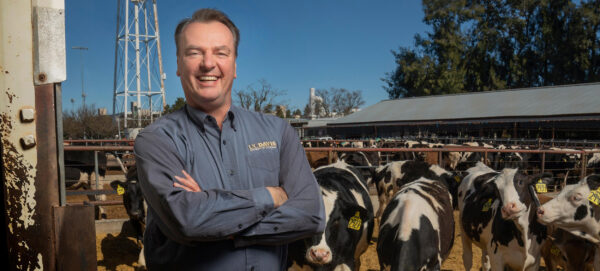
“Greenhouse gas guru”
The CLEAR Center is led by Frank Mitloehner, a professor at UC Davis and one of the world’s most prominent voices on the livestock industry’s environmental impact.
Mitloehner joined UC Davis in 2002. He rose to wider prominence in 2010, when he successfully argued against claims made by the UN Food and Agriculture Organisation (FAO) in its Livestock’s Long Shadow report, earning a retraction.
His beef with the report concerned its claim that livestock was responsible for more greenhouse emissions than the transport sector, which was underpinned by a flawed methodology.
In 2017, before they founded the CLEAR Center together, Mitloehner was paid $19,000 by IFEEDER in consultancy fees, according to tax records seen by Unearthed.
IFEEDER and CLEAR’s industry-led advisory committee have been eager to leverage their connections to help build Mitloehner’s personal brand, the documents show.
Newman’s memo describes how a “communications sub-committee” of the advisory group has been working with him on “expanding his proactive communications, outreach and recognition on key issues.”
That same document says the group is “working with Dr Mitloehner on outreach to the dietician community” and credits the North American Meat Institute with “preparing an outline of a paper with a potential [dietician] collaborator.”
It goes on to say that “several committee members have forwarded content for Dr Mitloehner to follow/engage with on Twitter”. Mitloehner’s social media clout has grown significantly since founding the CLEAR Center. In 2018, the MoU notes, Mitloehner had just 983 followers on Twitter, where he posts under the moniker @GHGGuru (greenhouse gas guru). Today he has more than 30,000 followers.
“I think it would be great to hear,” an executive for the American Feed Industry Association wrote to the CLEAR’s media manager in October last year, “about what information the CLEAR Center needs from the advisory committee, which would set up the reverse question to the committee of what types of resources or communication pieces the industry needs from the CLEAR Center.”
And what the industry needs from CLEAR is, well, clear. Dr Mitloehner and his centre produce research and provide an academically credible voice in conversations with journalists and policymakers, both which give a positive account of the environmental impacts of animal agriculture. In an internal document outlining the purpose of the CLEAR Center, IFEEDER said the American Feed Industry Association could use CLEAR to “share research findings in policy discussions happening within international standard-setting bodies and at the national level, shaping the future outlook for the industry.”
Mitloehner, it said, “provides a neutral, credible, third party voice to news reporters and stakeholder groups at conferences and other important governmental meetings” and the data produced by the centre “will show consumers that they can feel good about the choice they are making to include protein in their families’ diets.”
The document adds that the CLEAR Center’s aims include highlighting the meat industry’s “commitment to environmental, animal and human health” and being a “resource for the animal agriculture industry to look to for leadership in communicating with key audiences about the care and concern that goes into the production of nutritious animal protein”.
Viveca Morris, executive director of the Law, Ethics & Animals Program at Yale University, told Unearthed: “This is an example of the livestock feed industry funding a climate change-focused university program with the stated purpose of getting academics to serve as credible messengers for industry interests in front of policymakers and the public. These documents show that the UC Davis CLEAR Center is not neutral, not credible, and not independent of the industry.”
Throughout the tranche of CLEAR documents there are instances in which Mitloehner’s credentials and independent status are described as aiding meat industry communications. On one occasion, former AFIA chief Goodman recounts how Mitloehner invited a Washington Post journalist to visit UC Davis, describing the trip as “an opportunity” to influence her coverage. In a briefing for the advisory committee, the CLEAR Center touted Mitloehner’s use of twitter threads as ideal “for amplification from CLEAR Center stakeholders and collaborators” — referencing his widely shared criticism of a report by the Institute of Agriculture and Trade Policy (IATP) and his thread “dismantling” a New York Times op-ed entitled “The End of Meat is Here.”
Mitloehner told Unearthed: “The CLEAR Center and myself are not concerned with the financial interests of stakeholders or others in the livestock industry, we are concerned with developing environmental solutions in animal agriculture.”
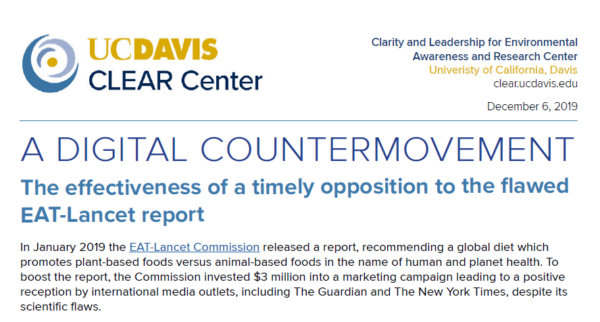
Culture wars
For some working at UC Davis, the CLEAR Center’s output – and particularly Mitloehner’s use of social media – is worrying.
Caspar Donnison, a postdoc researcher on CO2 removal and climate change at UC Davis, has publicly disagreed with Mitloehner and the CLEAR Center on Twitter. He told Unearthed that their social media content was “very one-sided, omits crucial details, and stokes the culture war that we see taking place around diets and climate.” It was, he said, “advocacy.”
“I have had a number of academics – both at UC Davis and internationally – share their concern with me at the bias in this social media messaging, and that this content is associated with our university UC Davis.”
These concerns were echoed by another UC Davis associate who asked to stay anonymous, but who described the centre’s communications as having “a consistently pro-industry orientation” and questioned whether the centre was “really acting in keeping with what universities and the public expect from academic researchers.”
The associate said that Mitloehener and the CLEAR Center had cherry-picked studies that do not accurately reflect the scientific consensus on livestock’s contribution to climate change. One such study, approvingly referenced by Mitloehner when testifying before a Senate committee, argues that if America were to stop consuming farmed animals it would reduce greenhouse gas emissions by just 2.6% and result in nutritional deficiencies. Leading food academics, including Willet and Oxford researcher Marco Springmann, have accused the study’s authors of relying on “highly unrealistic and narrow scenario design,” failing to account for feed crop production, and of “causing confusion in the debate about the transition toward a more plant-based diet.”
Donnison said the CLEAR Center is “ignoring a plethora of published papers in respected journals and the IPCC that dietary shifts towards plant-based diets have a major impact, reducing food GHG emissions and freeing up land for carbon and biodiversity recovery.”
Scientists who are critical of CLEAR say the centre’s own research also selects information and measuring techniques that minimise animal agriculture’s contribution to climate change.
The centre’s recent white paper, co-written by Mitloehner and one of his former graduate students, says that the US beef and dairy industries can become “climate neutral” by the 2040s through a combination of marginal reductions in methane emissions – less than 2% per year until 2030, achieved through efficiencies, and just a little more thereafter – and the adoption of a new greenhouse gas metric that treats ruminant methane more favourably.
However, Dr Carl Schleussner, head of climate science at the NGO Climate Analytics and researcher at Humboldt University Berlin, says this “paints a totally skewed picture of the need for urgent methane emissions reductions.”
He told Unearthed that Mitloehner uses a novel and controversial way of measuring agricultural methane emissions’ impact on the climate – dubbed GWP* – to “shift the baseline to make historic warming disappear.” This metric, he added, was “fantastic for the livestock industry that has made a disproportionate contribution to global warming to date.”
Mitloehner told Unearthed: “GWP* properly characterizes the temperature impact of methane emissions.” He added that his paper showed the cattle sector must “aggressively reduce emissions to reach a point in which they are no longer adding warming to the climate”.
In his other communications – blogs, social media posts, speeches – Mitloehner has described a scientist critical of animal agriculture as a ‘vegan activist,’ portrayed environmentalists as wishing to replace idyllic grassland used for feeding cattle with an industrialised wasteland, likened criticism of his work to cancel culture, and promoted climate denial blogs and conspiracy theories.
Jennifer Jacquet, an associate professor at New York University who has written about how polluting industries combat inconvenient science said Mitloehner’s centre is “using a very common script used across industry-funded experts.”
She told Unearthed: “The CLEAR documents show that he is a sock puppet for industry, not an independent scientist. Mitloehner is not a ‘greenhouse gas guru’ as his Twitter handle would lead people to believe but has a PhD in Animal Science. It’s not surprising that Mitloehner would do anything he is doing, but the fact that UC Davis is allowing the meat industry these kinds of agreements and to use the university as a soapbox is really disturbing.”
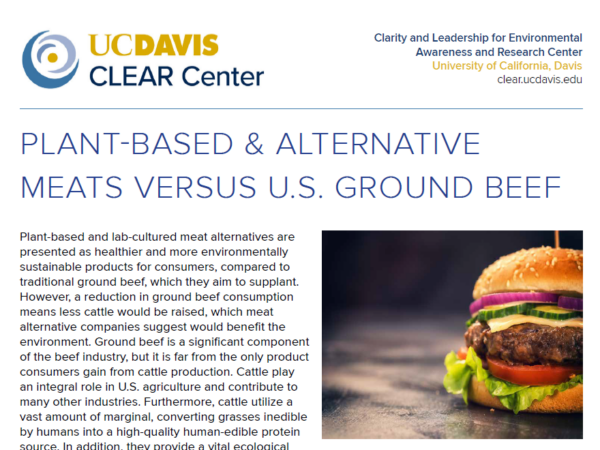
Plant based vs beef
Among the more than one hundred pages of correspondence with animal feed and beef trade associations obtained by Unearthed, more than a dozen are from briefings apparently produced by the centre for its advisory committee. These documents describe the centre’s output and impact in supporting the livestock industry’s public relations.
One of these briefings is headlined Plant-Based & Alternative Meats vs Ground Beef. It primarily describes a piece of research to be produced by one of Dr Mitloehner’s graduate students. The life cycle analysis, designed to “demonstrate the benefits of cattle production beyond the meat we eat,” was expected to be ready for peer review by January 2021, but that process – as of November 2022 – has not been completed. The Center had mapped out a plan to launch the study with social media, multimedia and traditional media outreach that focused on “the value of beef beyond your burger.”
In a video presentation of the paper, the student said that replacing ground beef with alternatives to meat would lead to “an increase in agricultural land use” and “an increase in greenhouse gas emissions”. Neither claim is made in the paper itself, which instead focuses on the economic impact of removing ground beef.
Mitloehner told Unearthed: “The focus of that work is to not only look at the environmental impacts of various vegan products gaining similar market share to that of milk alternatives, but also what would be the economic impacts of that as well. I imagine this information would be valuable to not only the beef sector, but also those producing plant-based products.”
Dr Florian Humpenöder, a land-use researcher at the Potsdam Institute for Climate Impact Research, contests those claims: “The peer-reviewed scientific literature clearly shows that feeding cattle requires vast tracts of cropland and rangeland. In contrast, plant-based meat alternatives require only a fraction of the land needed for beef production. The remainder of the land no longer needed for agriculture could be given back to nature, which would generate carbon and biodiversity gains.”
“The peer-reviewed literature also shows that the production of beef causes considerable amounts of carbon dioxide emissions from land-use change, methane emissions from enteric fermentation and nitrogen oxide emissions from animal manure and fertilizer application. The production of plant-based meat alternatives is much more resource-efficient and therefore causes much lower GHG emissions.”
According to a Mitloehner email obtained by Unearthed, the study comparing beef and plant-based alternatives was funded by the National Cattlemen’s Beef Association (NCBA), a leading lobby group for the industry. The NCBA confirmed that the work was done on behalf of NCBA, as a contractor to the Beef Checkoff programme, a levy on cattle producers that supports meat industry marketing.
In an exchange late last year with NCBA chief executive Colin Woodall, Mitloehner recommended that the group hire his student to be its senior director of sustainability — which it later did.
“As you know,” Mitloehner wrote, “I had several of my graduates take leadership roles within NCBA.” Two of those graduates have since taken up senior positions at Colorado State University, following spells with ag industry leaders — one at JBS, the other at Elanco, which has a seat on the CLEAR Center board.
Mitloehner told Unearthed he was “very proud” to see former students in roles “where they can directly help sectors reach sustainability goals”.
Woodall was effusive in his response to Mitloehner, thanking him for his “great work” and telling him: “You are a game changer for animal agriculture.”
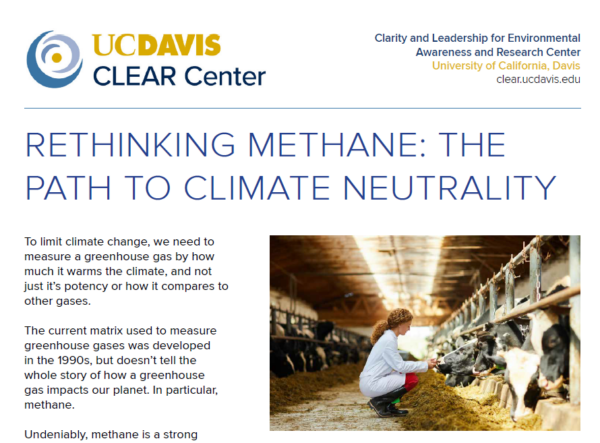
Rethinking methane
One of the debates Mitloehner has focused on most closely is whether scientists should revise the way they measure livestock emissions’ contribution to global warming — a fight that could have huge implications for the meat industry’s ability to effectively carry on business-as-usual.
Methane, the primary greenhouse gas emitted by cattle, produces nearly 30 times as much warming as carbon dioxide over one hundred years, and around 80 times as much over twenty years, according to the standard metrics. But methane has a much shorter atmospheric life, which Mitloehner argues means its contribution should be measured differently.
He proposes that the livestock industry adopt a new metric called GWP*, and aim for ‘climate neutrality’ rather than ‘carbon neutrality.’ The difference is that to be carbon neutral, emissions must be net-zero, whereas to be climate neutral – for a livestock producer using GWP* – means emissions need only see a marginal decline. Even if a herd continues to release vast amounts of methane, it can be described as climate neutral, or even ‘climate positive’.
In the exchange with Woodall, Mitloehner said “I felt that your message aligns very well with our work here at the UC Davis CLEAR Center, to achieve ‘Climate Neutrality’ for US beef,” and congratulated him for being “quite a bit ahead versus some of the other livestock groups, who still attempt to reach Carbon Neutrality.”
Earlier this year, Unearthed reported that leading lobbyists from the NCBA had told their members that adopting GWP* would mean that it’s “going to be pretty easy” to become climate neutral by 2040 “without reducing the number of cattle”. The lobbying effort described at that conference is underpinned by the work of Mitloehner and CLEAR under the banner Rethink Methane.
In the summer of 2020, the project was given a significant boost off the back of a Mitloehner-inspired online controversy. After fast food chain Burger King launched an advert comedically touting its new lemongrass-based cattle feed additive, designed to curb methane emissions, Mitloehner and the CLEAR Center became “key voices” in the online backlash, according to a briefing by the centre obtained by Unearthed. Some of his complaints were serious and well founded – such as that the research Burger King was relying on had not yet been peer-reviewed. But it was Mitloehner’s outrage that the ad blamed cow farts rather than cow belches that enjoyed the greatest cut-through with the media.
As CLEAR documents note, Mitloehner’s criticism shaped international coverage of the advert – including an item from the BBC – and then, “taking advantage of the momentum of the Burger King campaign,” he used the publicity to promote his effort to ‘rethink methane’. His blog on the controversy was picked up as an op-ed by “highly influential food/ag publication” Civil Eats and tweeted by influencer Michael Pollan and prominent climate scientist Michael Mann. “After this,” the CLEAR briefing explains, “the story angle of the Burger King campaign shifted within the mainstream media from celebrating Burger King’s campaign to highlighting how the agriculture industry found it problematic.”
As a result of the backlash, Burger King pulled the ad, removed its reference to farts and its clumsy caricature of a farmer, wrote to a beef industry group “acknowledging missteps,” and pledged to “work with the CLEAR Center on enteric emissions research and science communication.” Later that summer the Burger King corporation donated $106,000 to the CLEAR Center.
A Burger King spokesperson told Unearthed the company funded research by the CLEAR Center into emissions reductions, with the pilot project ending in 2021.
Expansion
What is clear throughout the correspondence between CLEAR and its donors is that the project is considered an unqualified success. And never more so than in the aftermath of the EAT-Lancet report, released shortly after the centre had been formed.
The ‘digital countermovement’ saw Mitloehner rally pro-meat academics to fight “against inaccuracies and misinformation inherent to the report and its promotion, with high success.” From Mitloehner’s point of view, as he wrote in a blog, the principal “danger” in the EAT-Lancet commission’s work was that “it leads the public to believe that food choices will drastically affect the climate and the environment overall”. For him, this is a “myth” to be opposed: “It surely has some effect, but nothing close to the impact of burning of fossil fuels!”
According to a CLEAR Center briefing on the academic backlash against EAT-Lancet, the mobilisation “was possible because of a champion [Mitloehner]” and that “the results of this David versus Goliath match overwhelmingly exceeded expectations.”
CLEAR went on to celebrate the peer-reviewed paper in The Lancet journal that highlighted the effectiveness of online opposition to EAT-Lancet, and which warned that health communication campaigns were “clearly susceptible to polarisation, so-called content pollution and disinformation.”
Such is the success of the CLEAR Center that its industry backers have helped set up a subcommittee “for Center branching out.”
In late 2021, when the topic of expansion was first mooted, there was debate over polling the advisory committee on “how the Clear Center should collaborate with other universities across the country?” An earlier version, dismissed as “too leading,” appeared to describe the plan favoured by some: “what are your quick thoughts on a ‘hub and spokes’ approach to growing the Clear Center? In this scenario, the hub would be UC Davis, and there would be satellite Clear Centers at universities around the county.”
As the CLEAR project looks to expand, and the need for significant reductions in greenhouse gases grows ever more urgent, leading voices in the academic community are concerned its actions will delay essential public policy efforts. Marion Nestle, the acclaimed food writer and a visiting professor at Cornell, likened the centre’s model to “the tobacco industry playbook”.
“[The CLEAR Center] is following rule #1: cast doubt on the science,” she said. “That’s all it has to do to get people to ignore current science and recommendations.”
“The tobacco industry was brilliant at delaying public policy on cigarette smoking. CLEAR is doing the same thing. It’s great that its efforts are being exposed.”




